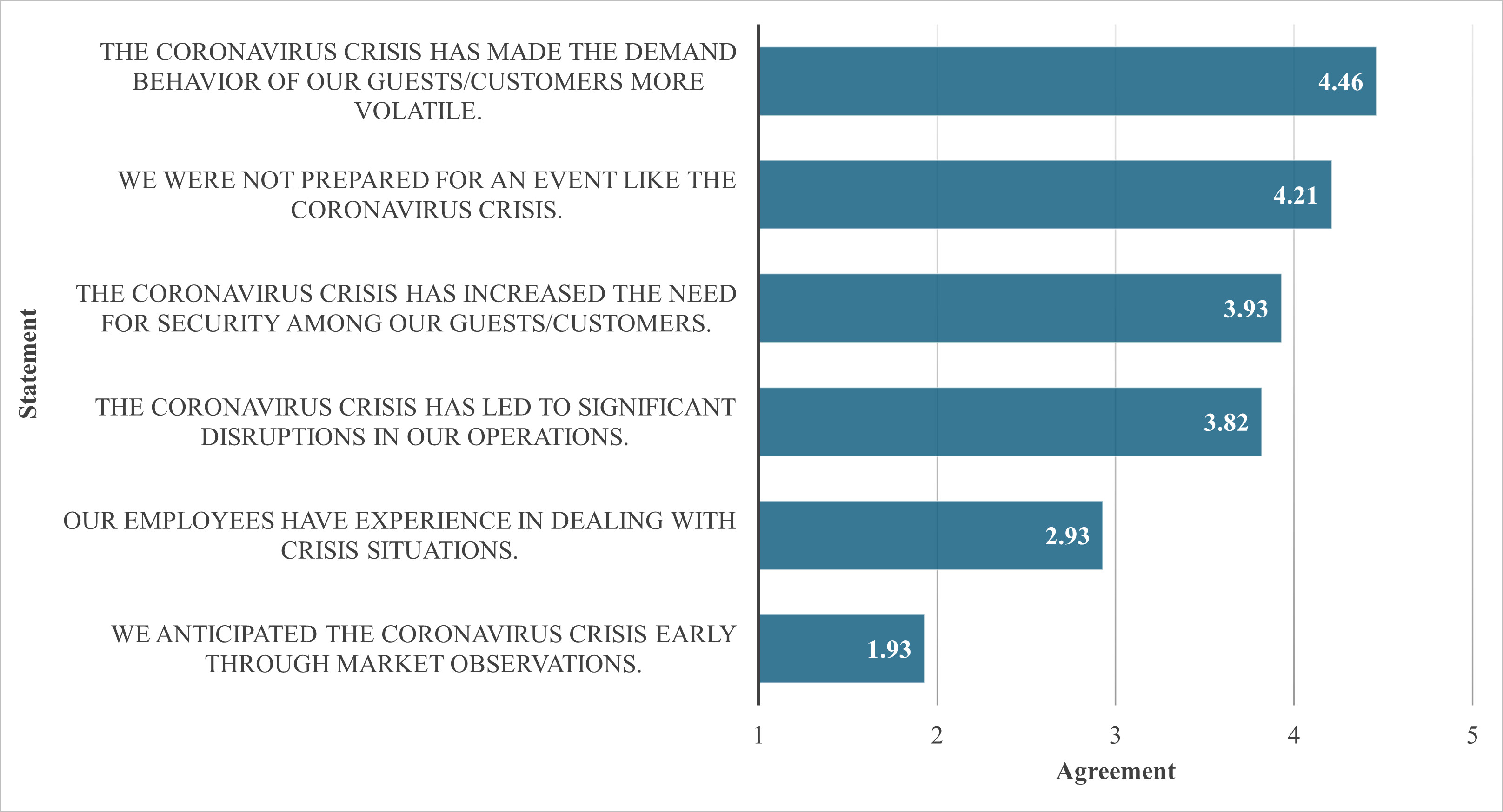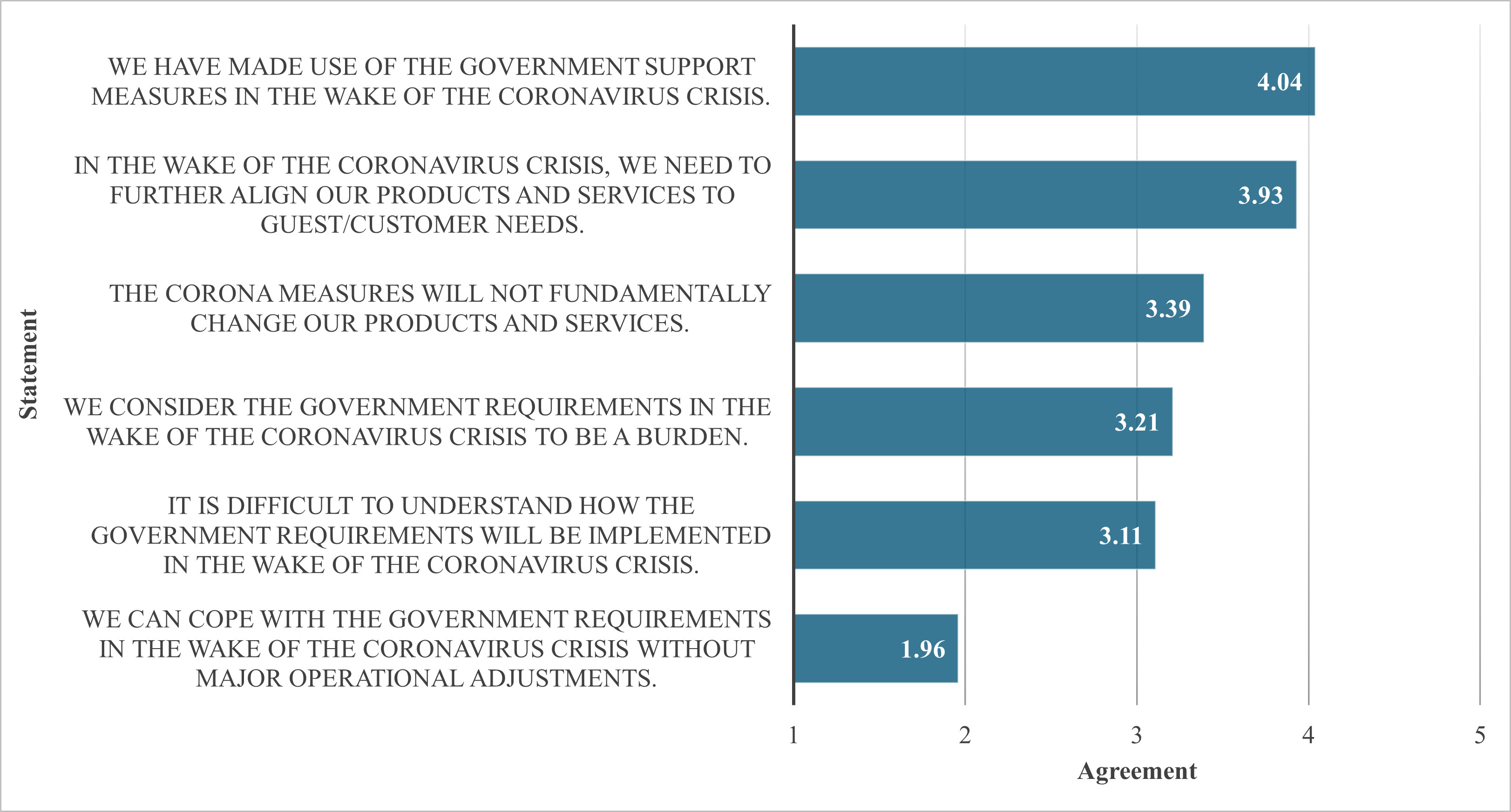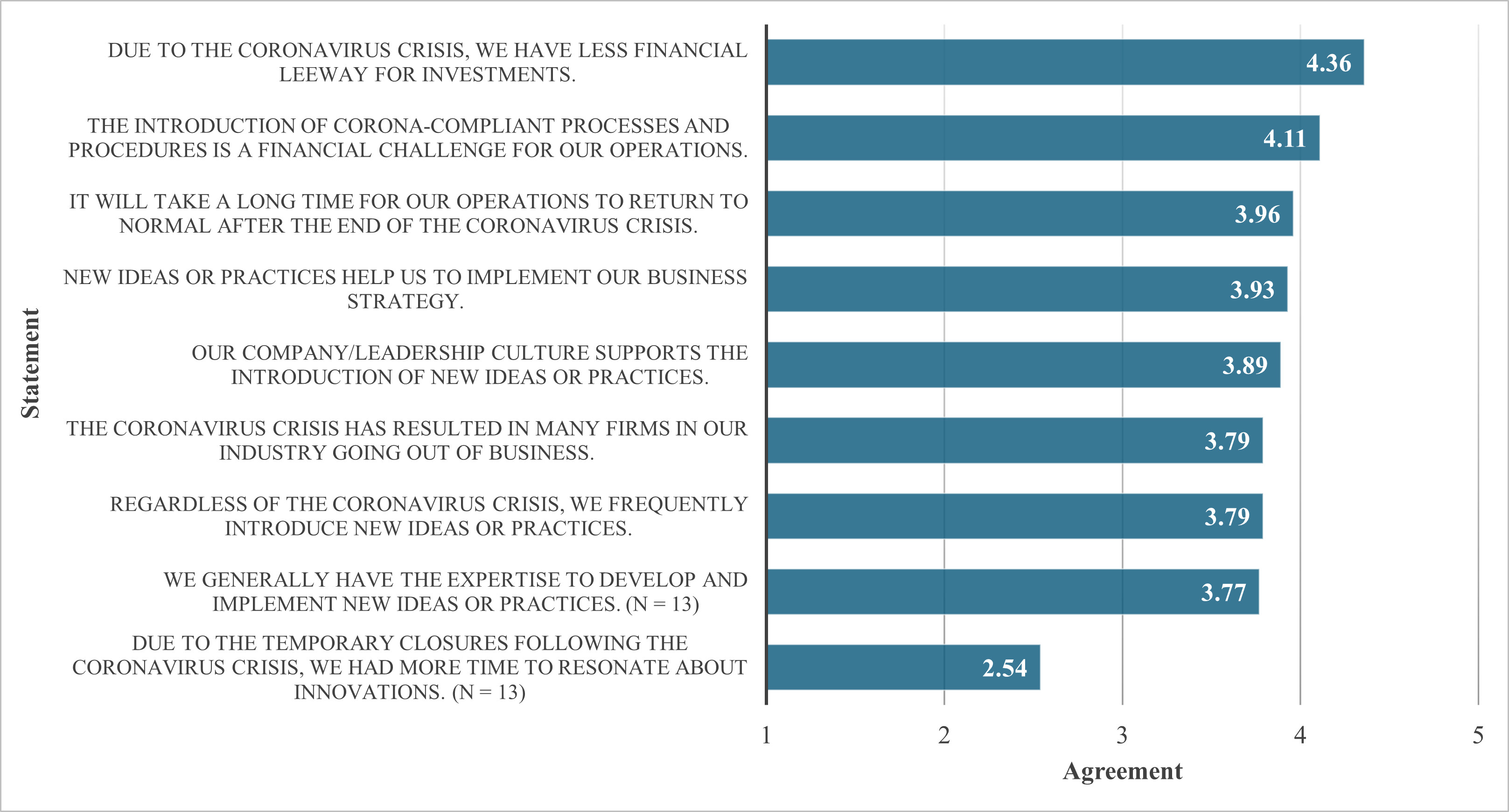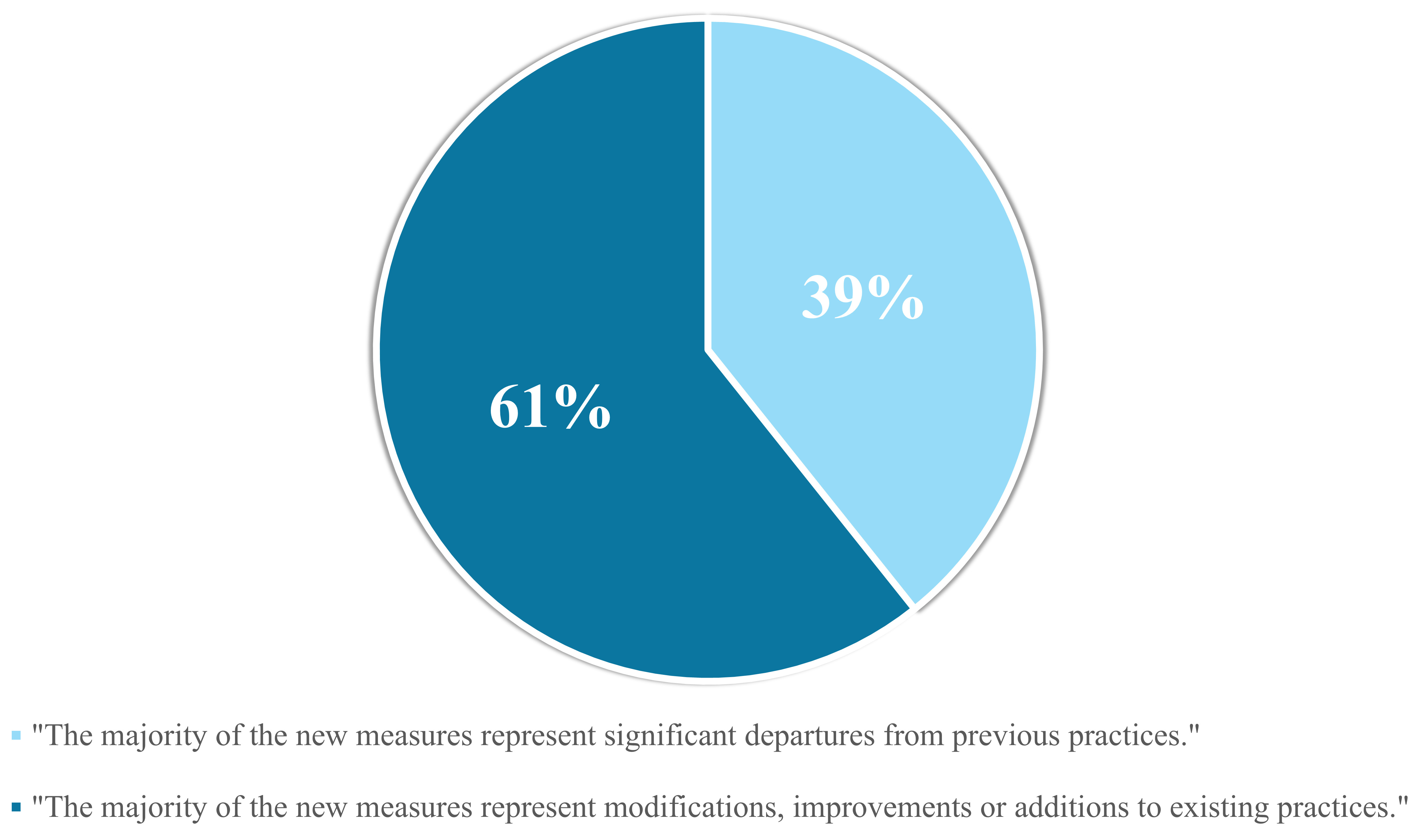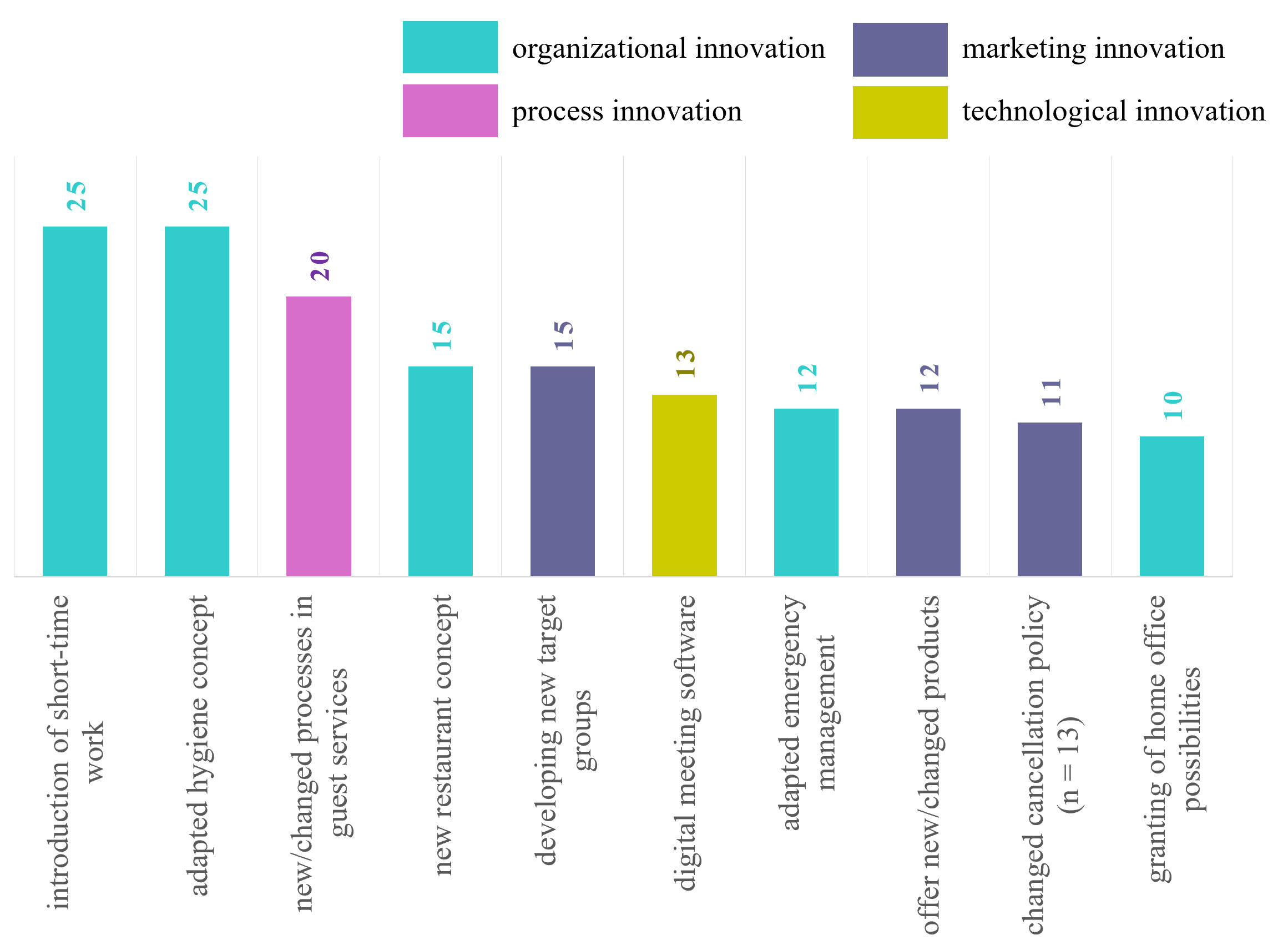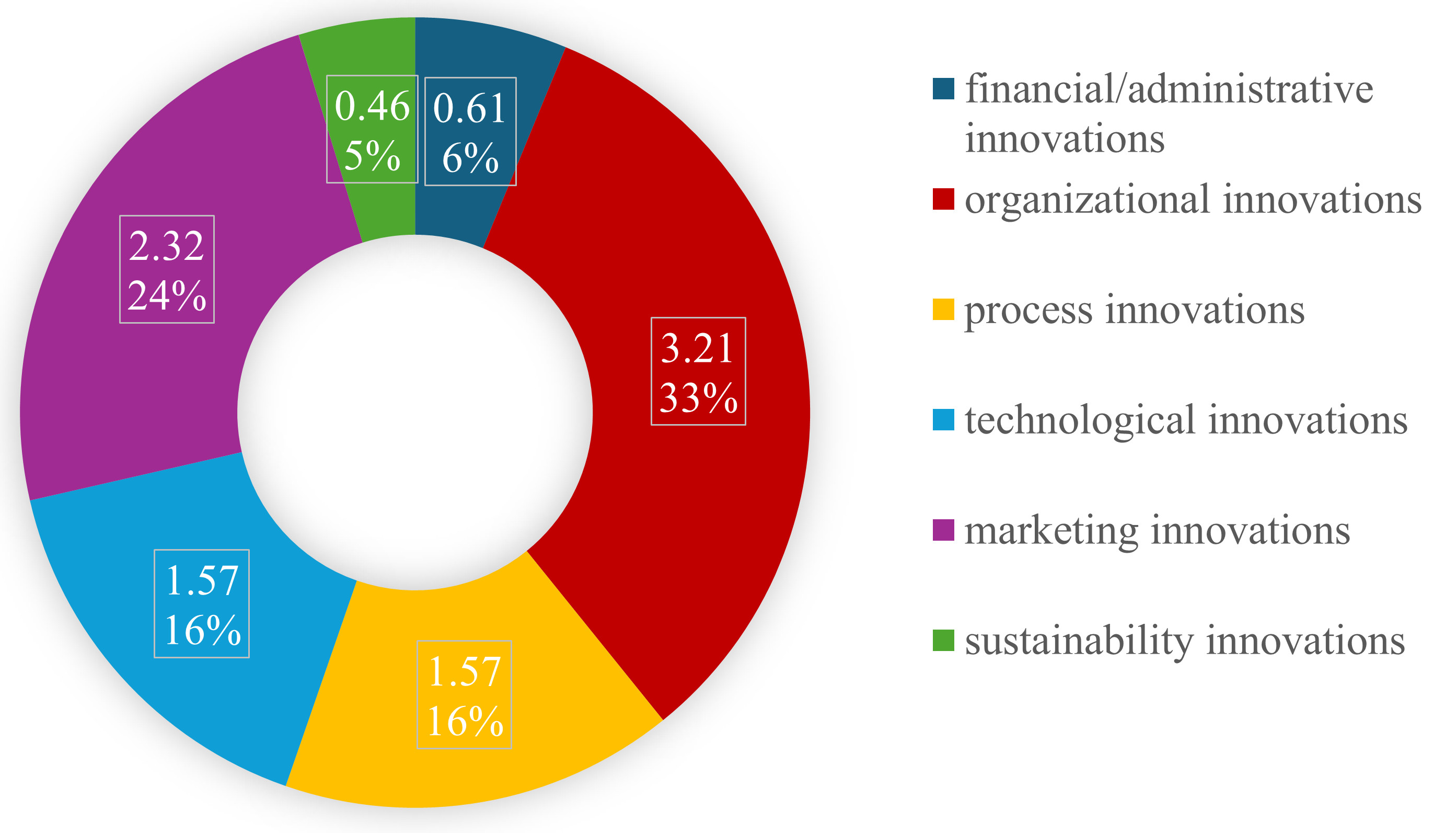Has the Coronavirus Crisis Ended Innovation Inertia? An Analysis of Accommodation Providers
Dresden School of Management, SRH Berlin University of Applied Sciences, 01097 Dresden, Saxony, Germany
Academic Editor:
Received: 13 December 2023 Accepted: 22 March 2024 Published: 27 March 2024
Abstract
The hospitality industry shows comparatively modest innovation activity. However, the coronavirus crisis challenged the industry and increased the need to implement new practices. Following a mixed methods, explanatory sequential research design, this study aims to examine the impact the crisis had on the innovation activity and implementation of different innovation types in the hospitality industry. For data collection, a structured survey of accommodation providers and complementary expert interviews were employed. The findings indicate three different phases in the accommodation providers’ response to the crisis, namely shock, acknowledgment, and adaptation and change. Each phase is characterized by distinct innovation behavior. In the shock phase, the businesses improvised and executed governmental orders. They tried to make sense of the crisis and recognized the need for change and innovation. In the acknowledgment phase, the businesses adapted their service offer to the “new normal” and communicated with their stakeholders to find individual solutions. Finally, in the adaptation and change phase, some accommodation providers were able to implement long-planned innovations and seize spontaneous innovation opportunities. Overall, incremental innovations were preferred to radical innovations, presumably due to cost reasons. Contrary to expectations, the accommodation providers did not show a preference for temporary innovations. Based on the findings, specific recommendations are formulated to increase the accommodation providers’ innovation efforts and prepare their resilience to future crises.
Figures in this Article
Keywords
Copyright © 2024
Antonschmidt. This article is distributed under the terms of the Creative Commons Attribution License (CC BY 4.0), which permits unrestricted use and distribution provided that the original work is properly cited.
Funding
This research received no specific grant from any funding agency in the public, commercial, or not-for-profit sectors.
Cite this Article
Antonschmidt, H. (2024). Has the Coronavirus Crisis Ended Innovation Inertia? An Analysis of Accommodation Providers. Highlights of Sustainability, 3(2), 116–128. https://doi.org/10.54175/hsustain3020009
References
1.
Organisation for Economic Co-Operation and Development (OECD). (2015). The Innovation Imperative. Contributing to Productivity, Growth and Well-being. https://www.oecd-ilibrary.org/science-and-technology/the-innovation-imperative_9789264239814-en (accessed 26 March 2024).
2.
Hjalager, A.-M. (1997). Innovation patterns in sustainable tourism. An analytical typology. Tourism Management, 18(1), 35–41. https://doi.org/10.1016/S0261-5177(96)00096-9
3.
Hjalager, A.-M. (2002). Repairing innovation defectiveness in tourism. Tourism Management, 23(5), 465–474. https://doi.org/10.1016/S0261-5177(02)00013-4
4.
Hjalager, A.-M. (2010). A review of innovation research in tourism. Tourism Management, 31(1), 1–12. https://doi.org/10.1016/j.tourman.2009.08.012
5.
Martínez-Román, J. A., Tamayo, J. A., Gamero, J., & Romero, J. E. (2015). Innovativeness and business performances in tourism SMEs. Annals of Tourism Research, 54, 118–135. https://doi.org/10.1016/j.annals.2015.07.004
6.
Martínez-Ros, E., & Orfila-Sintes, F. (2009). Innovation Activity in the Hotel Industry. Technovation, 29(9), 632–641. https://doi.org/10.1016/j.technovation.2009.02.004
7.
Orfila-Sintes, F., & Mattsson, J. (2009). Innovation behavior in the hotel industry. Omega, 37(2), 380–394. https://doi.org/10.1016/j.omega.2007.04.002
8.
Sundbo, J., Orfila-Sintes, F., & Sørensen, F. (2007). The innovative behaviour of tourism firms – Comparative studies of Denmark and Spain. Research Policy, 36(1), 88–106. https://doi.org/10.1016/j.respol.2006.08.004
9.
Prud’homme, B., & Raymond, L. (2013). Sustainable development practices in the hospitality industry: An empirical study of their impact on customer satisfaction and intentions. International Journal of Hospitality Management, 34, 116–126. https://doi.org/10.1016/j.ijhm.2013.03.003
10.
Keller, P. (2006). Innovation and Tourism Policy. In Innovation and Growth in Tourism (pp. 17–40). Organisation for Economic Co-Operation and Development (OECD).
11.
Lee, S. M., & Trimi, S. (2021). Convergence innovation in the digital age and in the COVID-19 pandemic crisis. Journal of Business Research, 123, 14–22. https://doi.org/10.1016/j.jbusres.2020.09.041
12.
World Health Organization (WHO). (2020). COVID-19 management in hotels and other entities of the accommodation sector. https://iris.who.int/bitstream/handle/10665/333992/WHO-2019-nCoV-Hotels-2020.3-eng.pdf?sequence=1 (accessed 26 March 2024).
13.
Dahlke, J., Bogner, K., Becker, M., Schlaile, M. P., Pyka, A., & Ebersberger, B. (2021). Crisis-driven innovation and fundamental human needs: A typological framework of rapid-response COVID-19 innovations. Technological Forecasting & Social Change, 169, 120799. https://doi.org/10.1016/j.techfore.2021.120799
14.
Hidalgo, A., Martín-Barroso, D., Nuñez-Serrano, J. A., Turrión, J., & Velázquez, F. J. (2022). Does hotel management matter to overcoming the COVID-19 crisis? The Spanish case. Tourism Management, 88, 104395. https://doi.org/10.1016/j.tourman.2021.104395
15.
Damanpour, F. (2020). Organizational Innovation. Theory, Research, and Direction. Edward Elgar.
16.
Schumpeter, J. (2003). Capitalism, Socialism & Democracy (5th ed.). Routledge.
17.
Taalbi, J. (2017). What drives innovation? Evidence from economic history. Research Policy, 46(8), 1437–1453. https://doi.org/10.1016/j.respol.2017.06.007
18.
Vargo, S. L., & Lusch, R. F. (2016). Institutions and axioms: an extension and update of service-dominant logic. Journal of the Academy of Marketing Science, 43, 5–23. https://doi.org/10.1007/s11747-015-0456-3
19.
Weiermair, K. (2006). Product Improvement or Innovation: What is the Key to Success in Tourism? In Innovation and Growth in Tourism (pp. 53–69). Organisation for Economic Co-Operation and Development (OECD).
20.
Ebersberger, B., Herstad, S. J., & Nordli, A. (2021). Hospitality innovation strategies: Robustness analysis of paths to firm performance. Tourism Management, 85, 104310. https://doi.org/10.1016/j.tourman.2021.104310
21.
Organisation for Economic Co-Operation and Development (OECD). (2006). Innovation and Growth in Tourism. https://doi.org/10.1787/9789264025028-en
22.
Rogers, E. M. (2003). Diffusion of Innovations (5th ed.). Free Press.
23.
Chandy, R. K., & Prabhu, J. C. (2010). Innovation typologies. In B. Bayus (Ed.), Wiley International Encyclopedia of Marketing (Vol. 5, pp. 1–9). Wiley. https://doi.org/10.1002/9781444316568.wiem05012
24.
Hipp, C., & Grupp, H. (2005). Innovation in the service sector: The demand for service-specific innovation measurement concepts and typologies. Research Policy, 34(4), 517–535. https://doi.org/10.1016/j.respol.2005.03.002
25.
Giddens, A. (1984). The Constitution of Society. Outline of the Theory of Structuration. University of California Press.
26.
Scheidegger, E. (2006). Can the State promote Innovation in Tourism? Should it? In Innovation and Growth in Tourism (pp. 11–16). Organisation for Economic Cooperation and Development (OECD).
27.
Duarte Alonso, A., Kiat Kok, S., Bressan, A., O’Shea, M., Sakellarios, N., Koresis, A., et al. (2020). COVID-19, aftermath, impacts, and hospitality firms: An international perspective. International Journal of Hospitality Management, 91, 102654. https://doi.org/10.1016/j.ijhm.2020.102654
28.
United Nations (UN). (2020). Policy Brief: COVID-19 and Transforming Tourism. https://unsdg.un.org/sites/default/files/2020-08/sg_policy_brief_covid-19_tourism_august_2020.pdf (accessed 26 March 2024).
29.
Krishnan, V., Mann, R., Seitzman, N., & Wittkamp, N. (2020). Hospitality and COVID-19: How long until ‘no vacancy’ for US hotels? McKinsey. https://www.mckinsey.com/industries/travel-logistics-and-infrastructure/our-insights/hospitality-and-covid-19-how-long-until-no-vacancy-for-us-hotels (accessed 26 March 2024).
30.
Chiu, A. S. F., Aviso, K. B., Baquillas, J., & Tan, R. R. (2020). Can Disruptive Events Trigger Transitions Towards Sustainable Consumption? Cleaner and Responsible Consumption, 1, 100001. https://doi.org/10.1016/j.clrc.2020.100001
31.
Breier, M., Kallmuenzer, A., Clauss, T., Gast, J., Kraus, S., & Tiberius, V. (2021). The role of business model innovation in the hospitality industry during COVID-19 crisis. International Journal of Hospitality Management, 92, 102723. https://doi.org/10.1016/j.ijhm.2020.102723
32.
Gursoy, D., Chi, C. G., & Chi, O. H. (2020). Restaurant and hotel customers’ sentiment analysis. Would they come back? If they would, WHEN? https://www.uwi.edu/covid19/sites/covid19/files/Covid-19%20Summary%20Report%20-%20Restaurant%20and%20hotel%20customers%E2%80%99%20sentiment%20analysis.pdf (accessed 26 March 2024).
33.
Hao, F., Xiao, Q., & Chon, K. (2020). COVID-19 and China’s Hotel Industry: Impacts, a Disaster Management Framework, and Post-Pandemic Agenda. International Journal of Hospitality Management, 90, 102636. https://doi.org/10.1016/j.ijhm.2020.102636
34.
Damanpour, F. (1991). Organizational Innovation: A Meta-Analysis of Effects of Determinants and Moderators. Academy of Management Journal, 34(3), 555–590. https://doi.org/10.2307/256406
35.
Nelson, R. R., & Winter, S. G. (1977). In search of useful theory of innovation. Research Policy, 6(1), 36–76. https://doi.org/10.1016/0048-7333(77)90029-4
36.
Hauser, J., Tellis, G. J., & Griffin, A. (2006). Research on Innovation: A Review and Agenda for Marketing Science. Marketing Science, 25(6), 687–717. https://doi.org/10.1287/mksc.1050.0144
37.
Sundbo, J. (2015). Innovation, Theory of. In J. D. Wright (Ed.), International Encyclopedia of the Social & Behavioral Sciences (2nd ed., Vol. 12, pp. 169–174). Elsevier. https://doi.org/10.1016/B978-0-08-097086-8.32075-X
38.
Creswell, J. W. (2014). Research Design: Qualitative, Quantitative, and Mixed Methods Approaches (4th ed.). SAGE.
39.
Mayring, P. (2000). Qualitative Content Analysis. Forum Qualitative Sozialforschung Forum: Qualitative Social Research, 1(2), Art. 20. https://doi.org/10.17169/fqs-1.2.1089
40.
Fink, S. L., Beak, J., & Taddeo, K. (1971). Organizational Crisis and Change. The Journal of Applied Behavioral Science, 7(1), 15–41. https://doi.org/10.1177/002188637100700103
41.
Lombardi, S., Pina e Cunha, M., & Giustiniano, L. (2021). Improvising resilience: The unfolding of resilient leadership in COVID-19 times. International Journal of Hospitality Management, 95, 102904. https://doi.org/10.1016/j.ijhm.2021.102904
42.
Sharma, V., & Bhat, D. A. R. (2022). Co-Creation and Technological Innovation: The Predictors of Guest Satisfaction and Revisit Intention in Hospitality Industry. International Journal of Hospitality & Tourism Systems, 15(1), 91–100.
43.
AlKayid, K., Selem, K. M., Shehata, A. E., & Tan, C. C. (2023). Leader vision, organizational inertia and service hotel employee creativity: Role of knowledge-donating. Current Psychology, 42, 3382–3394. https://doi.org/10.1007/s12144-022-02743-6
44.
Verdu-Jover, A. J., Alos-Simo, L., & Gomez-Graz, J.-M. (2018). Adaptive culture and product/service innovation outcomes. European Management Journal, 36(3), 330–340. http://dx.doi.org/10.1016/j.emj.2017.07.004
45.
Elkhwesky, Z., El Manzani, Y., & Elbayoumi Salem, I. (2024). Driving hospitality and tourism to foster sustainable innovation: A systematic review of COVID-19-related studies and practical implications in the digital era. Tourism and Hospitality Research, 24(1), 115–133. https://doi.org/10.1177/14673584221126792
46.
Hoang, G., Nguyen, H., Luu, T. T., & Nguyen, T. T. (2023). Linking entrepreneurial leadership and innovation performance in hospitality firms: the roles of innovation strategy and knowledge acquisition. Journal of Service Theory and Practice, 33(4), 511–536. https://doi.org/10.1108/JSTP-09-2022-0203
Metrics
Loading...
Journal Menu
Journal Contact
Highlights of Sustainability
Editorial Office
Highlights of Science
Avenida Madrid, 189-195, 3-3
08014 Barcelona, Spain
08014 Barcelona, Spain
Ms.
Cathy Wang
Managing Editor
